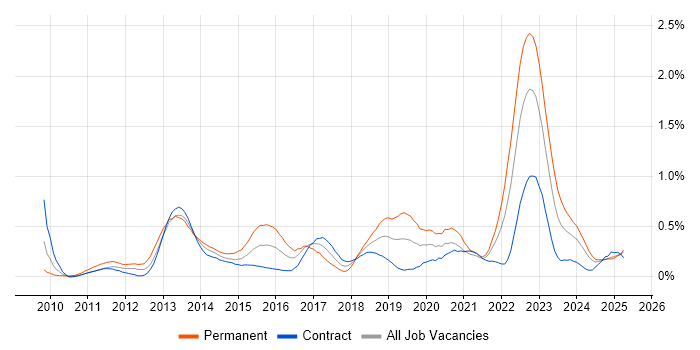Low Latency
UK > Scotland
The table below provides summary statistics and salary benchmarking for jobs advertised in Scotland requiring Low Latency skills. It covers permanent job vacancies from the 6 months leading up to 4 January 2026, with comparisons to the same periods in the previous two years.
| 6 months to 4 Jan 2026 |
Same period 2025 | Same period 2024 | |
|---|---|---|---|
| Rank | 138 | 138 | 167 |
| Rank change year-on-year | 0 | +29 | -82 |
| Permanent jobs citing Low Latency | 4 | 4 | 26 |
| As % of all permanent jobs in Scotland | 0.15% | 0.15% | 0.85% |
| As % of the Processes & Methodologies category | 0.18% | 0.16% | 0.90% |
| Number of salaries quoted | 3 | 4 | 26 |
| 10th Percentile | £42,000 | £37,517 | £42,500 |
| 25th Percentile | £43,125 | £43,167 | £50,686 |
| Median annual salary (50th Percentile) | £45,000 | £50,029 | £61,250 |
| Median % change year-on-year | -10.05% | -18.32% | -9.44% |
| 75th Percentile | - | £55,800 | £83,125 |
| 90th Percentile | - | £59,489 | £91,934 |
| UK median annual salary | £112,500 | £95,000 | £110,000 |
| % change year-on-year | +18.42% | -13.64% | +15.79% |
All Process & Methodology Skills
Scotland
Low Latency falls under the Processes and Methodologies category. For comparison with the information above, the following table provides summary statistics for all permanent job vacancies requiring process or methodology skills in Scotland.
| Permanent vacancies with a requirement for process or methodology skills | 2,191 | 2,453 | 2,884 |
| As % of all permanent jobs advertised in Scotland | 80.52% | 92.53% | 94.71% |
| Number of salaries quoted | 1,069 | 1,034 | 1,784 |
| 10th Percentile | £26,250 | £32,325 | £25,000 |
| 25th Percentile | £30,250 | £41,250 | £33,750 |
| Median annual salary (50th Percentile) | £40,000 | £55,000 | £52,500 |
| Median % change year-on-year | -27.27% | +4.76% | -8.70% |
| 75th Percentile | £65,000 | £70,000 | £69,800 |
| 90th Percentile | £82,292 | £88,750 | £83,750 |
| UK median annual salary | £55,000 | £60,000 | £60,000 |
| % change year-on-year | -8.33% | - | -4.00% |
Low Latency
Job Vacancy Trend in Scotland
Historical trend showing the proportion of permanent IT job postings citing Low Latency relative to all permanent IT jobs advertised in Scotland.

Low Latency
Salary Trend in Scotland
Salary distribution trend for jobs in Scotland citing Low Latency.

Low Latency
Job Locations in Scotland
The table below looks at the demand and provides a guide to the median salaries quoted in IT jobs citing Low Latency within the Scotland region over the 6 months to 4 January 2026. The 'Rank Change' column provides an indication of the change in demand within each location based on the same 6 month period last year.
| Location | Rank Change on Same Period Last Year |
Matching Permanent IT Job Ads |
Median Salary Past 6 Months |
Median Salary % Change on Same Period Last Year |
Live Jobs |
|---|---|---|---|---|---|
| Renfrewshire | - | 3 | £45,000 | - | 2 |
| Edinburgh | -6 | 1 | - | - | 8 |
| Low Latency UK |
|||||
Low Latency
Co-Occurring Skills & Capabilities in Scotland by Category
The following tables expand on the one above by listing co-occurrences grouped by category. They cover the same employment type, locality and period, with up to 20 co-occurrences shown in each category:
|
|
|||||||||||||||||||||||||||||||||||||||||||||
|
|
|||||||||||||||||||||||||||||||||||||||||||||
|
|
|||||||||||||||||||||||||||||||||||||||||||||
|
|
|||||||||||||||||||||||||||||||||||||||||||||
|
||||||||||||||||||||||||||||||||||||||||||||||
